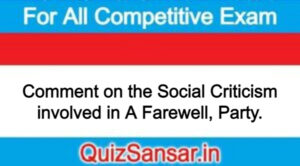
Comment on the Social Criticism involved in A Farewell, Party.
Comment on the Social Criticism involved in A Farewell, Party.
Ans.
The Farewell party brings out the egoistic and showy nature of a fair section of those who were invited. As often happens in this kind of social gathering, people are keen to splurge their dresses, to be unduly effusive even to an almost stranger. Beneath the veil of their apparent sincerity lurks dry formality albeit sweetened by outward manners. The persons who gathered at the party, though they included neighbours and familiar faces were hardly ever on intimate terms with Bina, who could find little time for social life as she had to look after a handicapped child who needed constant affection. Bina was compelled to cut her off from socially mixing with people outside the family, from ‘the more jovial circles of mahjong, bridge, coffee parties’ .etc. So Bina did not have much of a social life but out of a sense of social duty. perhaps, she throws a party. Anita Desai deftly sketches the setting and characters with brilliant touches. The superiority complex of those serving in foreign companies or at least having a foreign collaboration coloured the lives of not only them but their wives too. Mr. Raman’s passing on the cigarettes made his exclusively Indian Company is thought to be had manners by the elite executives of the foreign companies. The ‘company wises’ formed a closed ring. ‘gabbling and whirring with social bitchiness’.
Outwardly, every one in the party seemed to be interested in Bina’s affairs but few had genuine concerns. The so called elite circle of the company wives are described as ‘women to whom the most awful thing that had ever happened was the screw of a golden ear ring disappearing down the bathroom sink or a mother-in-law’s visit or an ayah deserting just before the arrival of guests.’ The company executives were losing no opportunity to advertise their classiness with a seemingly casual air, as one does talking about ‘golf matches at the Willingdon as though he had often played there with Raman, another spoke of Kababs eaten on the roadside after a party as though Raman had been one of the gang. The ‘key-note’ of the party is the ‘false-note.. Sounded by upper strata fashionable set who were as if doing a favour and maintaining social etiquette while they had little or no concern for the hosts. After examining these ‘respectable’ citizens, the high-ups in social ladder Anita introduces a character Miss Dutta, the typical society woman, in her middle-age, but making the best of what residual charm she has. She has no family of her own and no wonder that she has enlisted herself as a town busy-body by becoming secretary or chairman of as many as possible philanthropic of cultural organizations.
Miss Dutta, in the garb of a socially aware ‘do-gooder’ is perhaps, a sex-starved middle aged matron who seems not to discriminate in matters of companionship, be it Mr. Bose or Mr. Raman.
The saving grace of the story is that the treatment meted out to the deficient characters is not vitriolic but comical, keeping with the best traditions of the comic Muse.
-
Write the critical appreciation of the poem No. 12 entitled Far Below Flowed.
-
Write the critical appreciation of the poem No. 11 entitled Leave this Chanting.






